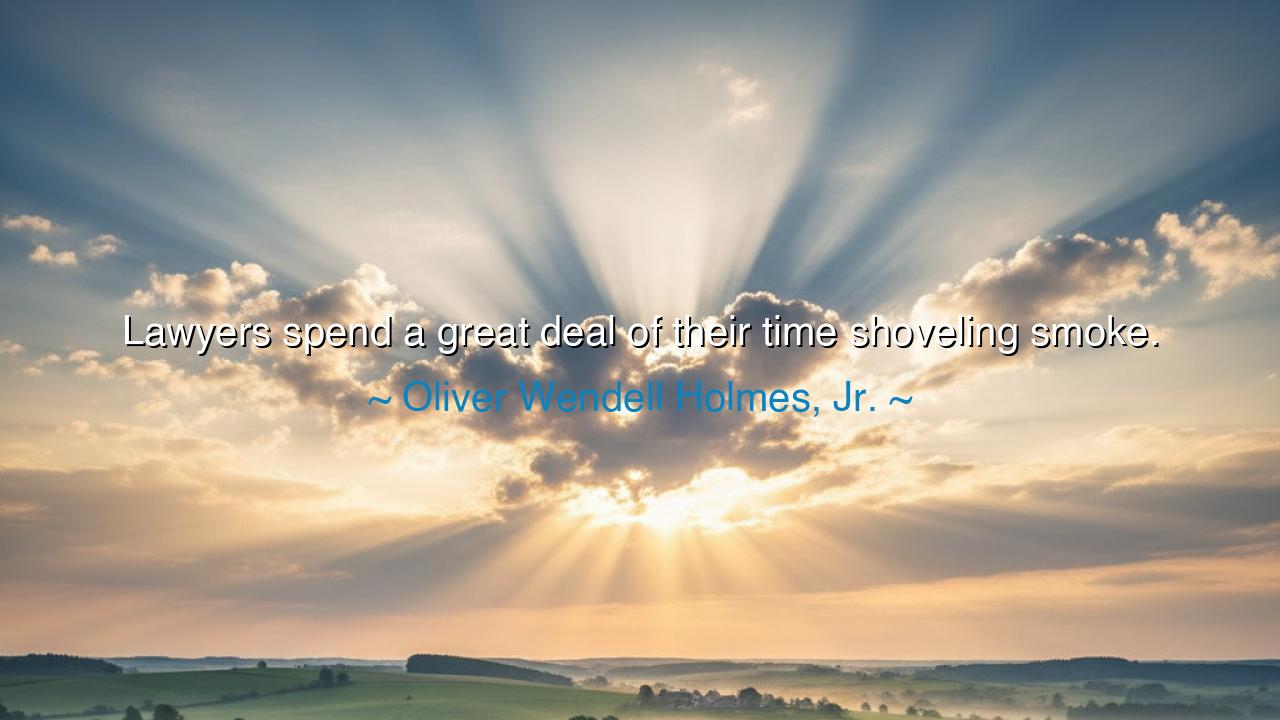
Lawyers spend a great deal of their time shoveling smoke.






The great Oliver Wendell Holmes, Jr., a judge whose words still thunder in the halls of justice, once said: “Lawyers spend a great deal of their time shoveling smoke.” This phrase, born from both wit and weary wisdom, captures the tension between appearance and substance, between the noble pursuit of justice and the endless fog of human argument. Holmes, who served as a Justice of the United States Supreme Court for three decades, was no stranger to the labyrinth of the law. He had seen how easily the pursuit of truth could become lost in rhetoric—how the brightness of reason could dim beneath clouds of cleverness. His statement is not merely a jest about lawyers; it is a warning to all who seek truth through words.
To shovel smoke is to labor mightily and yet grasp nothing solid. It is the work of those who strive amid illusion, mistaking motion for meaning. Holmes spoke from a lifetime of observing how legal minds—brilliant, articulate, tireless—often spend their days arguing shadows rather than substance, piling logic upon logic, precedent upon precedent, until the original question is buried beneath a mountain of vapor. The smoke he speaks of is not evil; it is the natural byproduct of human complexity. But Holmes, ever the realist, reminds us that brilliance alone cannot clear the air—it takes humility and honesty to see through the haze.
This insight reaches far beyond the courtroom. It is the plight of every thinker, every scholar, every leader who confuses eloquence with truth. There are those who build entire towers of reasoning upon the fog of assumption, only to find that when the wind of reality blows, their towers vanish. Holmes’s words recall the ancient wisdom of Socrates, who confessed that he knew nothing, and in that confession found the only true wisdom. For to shovel smoke without realizing it is folly—but to recognize the smoke for what it is, and seek what lies beyond it, is enlightenment.
Consider the story of Clarence Darrow, one of the most famous lawyers in American history. During the Scopes “Monkey” Trial of 1925, Darrow defended a teacher accused of violating a Tennessee law that forbade the teaching of evolution. The courtroom was filled with rhetoric—religion clashed with science, law with belief, pride with progress. Both sides hurled words like weapons. Yet beneath all the speeches, the true question was simple: should a man be punished for teaching truth as he saw it? In that moment, Darrow’s task was to pierce through the smoke—to remind the court that law must serve reason, not superstition. His courage to confront the fog of convention made that trial a turning point in the history of thought.
Holmes’s remark also carries a kind of weary compassion. He does not condemn lawyers for shoveling smoke; he acknowledges it as part of their calling. For human affairs are seldom clear. The law itself is an art built upon interpretation, and interpretation is born of language—fragile, shifting, imperfect. Thus, even the most honest advocate must navigate through haze. The lesson is not to despise the fog, but to labor through it with integrity—to remember that beyond every argument lies a living soul, beyond every statute a human story. To forget this is to lose the very heart of justice.
There is also a mirror here for every one of us. How often do we, too, shovel smoke in our lives—arguing endlessly over trivial matters, defending pride instead of truth, mistaking noise for meaning? Holmes’s words urge us to seek clarity, to value substance over show, to listen more than we speak. For wisdom is not found in winning arguments but in perceiving reality as it is. The true sage clears the smoke within his own mind before trying to clear it from others.
The lesson then, is both humbling and hopeful: be wary of the fog that words can weave. Whether in courtrooms, classrooms, or daily life, strive always to touch the truth that lies beneath the surface of speech. Practical action: when you speak, ask yourself—does this illuminate or obscure? When you argue, ask—am I seeking truth or victory? And when you listen, ask—what reality hides beneath the words? For those who live with this awareness will waste less time shoveling smoke, and spend more time building light.
Thus, Holmes’s reflection stands as a timeless parable: the world is filled with smoke, but not without purpose. It is there to test our discernment. And those who dare to look through it with patience and sincerity shall one day see what the clever miss—the steady flame of truth that burns, unwavering, behind the veil.






AAdministratorAdministrator
Welcome, honored guests. Please leave a comment, we will respond soon